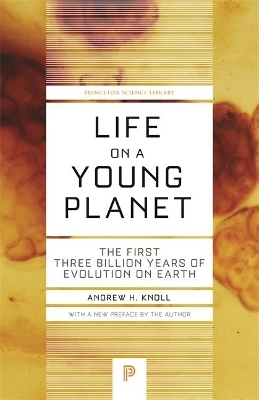
Life on a Young Planet
Princeton University Press (Verlag)
978-0-691-16553-0 (ISBN)
Australopithecines, dinosaurs, trilobites--such fossils conjure up images of lost worlds filled with vanished organisms. But in the full history of life, ancient animals, even the trilobites, form only the half-billion-year tip of a nearly four-billion-year iceberg. Andrew Knoll explores the deep history of life from its origins on a young planet to the incredible Cambrian explosion, presenting a compelling new explanation for the emergence of biological novelty. The very latest discoveries in paleontology--many of them made by the author and his students--are integrated with emerging insights from molecular biology and earth system science to forge a broad understanding of how the biological diversity that surrounds us came to be. Moving from Siberia to Namibia to the Bahamas, Knoll shows how life and environment have evolved together through Earth's history. Innovations in biology have helped shape our air and oceans, and, just as surely, environmental change has influenced the course of evolution, repeatedly closing off opportunities for some species while opening avenues for others.
Readers go into the field to confront fossils, enter the lab to discern the inner workings of cells, and alight on Mars to ask how our terrestrial experience can guide exploration for life beyond our planet. Along the way, Knoll brings us up-to-date on some of science's hottest questions, from the oldest fossils and claims of life beyond the Earth to the hypothesis of global glaciation and Knoll's own unifying concept of "permissive ecology." In laying bare Earth's deepest biological roots, Life on a Young Planet helps us understand our own place in the universe--and our responsibility as stewards of a world four billion years in the making. In a new preface, Knoll describes how the field has broadened and deepened in the decade since the book's original publication.
Andrew H. Knoll is the Fisher Professor of Natural History at Harvard University and a member of the National Academy of Sciences. A paleontologist by training, he has spent more than two decades working to integrate geological and biological perspectives on early life.
Acknowledgments ix Preface to the New Paperback Edition xi Prologue 1 Chapter 1. In the Beginning? 6 Chapter 2. The Tree of Life 16 Chapter 3. Life's Signature in Ancient Rocks 32 Chapter 4. The Earliest Glimmers of Life 50 Chapter 5. The Emergence of Life 72 Chapter 6. The Oxygen Revolution 89 Chapter 7. The Cyanobacteria, Life's Microbial Heroes 108 Chapter 8. The Origins of Eukaryotic Cells 122 Chapter 9. Fossils of Early Eukaryotes 139 Chapter 10. Animals Take the Stage 161 Chapter 11. Cambrian Redux 179 Chapter 12. Dynamic Earth, Permissive Ecology 206 Chapter 13. Paleontology ad Astra 225 Epilogue 243 Further Reading 247 Index 269
| Reihe/Serie | Princeton Science Library |
|---|---|
| Vorwort | Andrew H. Knoll |
| Zusatzinfo | 8 color illus. 25 halftones. 47 line illus. |
| Verlagsort | New Jersey |
| Sprache | englisch |
| Maße | 140 x 216 mm |
| Gewicht | 28 g |
| Themenwelt | Sachbuch/Ratgeber ► Natur / Technik |
| Naturwissenschaften ► Biologie ► Evolution | |
| Naturwissenschaften ► Geowissenschaften ► Mineralogie / Paläontologie | |
| ISBN-10 | 0-691-16553-X / 069116553X |
| ISBN-13 | 978-0-691-16553-0 / 9780691165530 |
| Zustand | Neuware |
| Haben Sie eine Frage zum Produkt? |
aus dem Bereich


